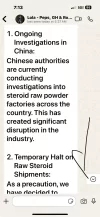Spaceman Spiff
Subscriber
Importation will always going to have its ups and downs. Lol . It will find it's way here regardless. Laws will be in place to stop it, there will be other ways around it.I can point to the detailed legislation to clamp down on de minimus, the product of more congressional focus than any other issue over the last 2 years, a clear priority that has the intense attention of a multitude of powerful interests from industry, unions, law enforcement, government finance, and the public watching tens of thousands of their children die every year. Specific tactics the CBP is putting into place, "practice" crackdowns that, overnight. have broken Indian pharma's ability to ship anything controlled to the US. Countless articles about the coming crackdown in every major newspaper, industry trade journals from apparel to cargo, and business bracing itself for massive changes. Hundreds of Chinese companies including giants like Temu and Schein spending billions on changing their operations by establishing warehouses in the US and Mexico jn anticipation of all this taking place.
They can't stop the fentanyl precursors, the Glock switch machine guns that are flooding every city, the counterfeits industry and unions are screaming is killing them, and the tens of billions of dollars of customs duty the government. is losing to evasion without also stopping your box of steroids
...and some ignorant cunts who never heard the term "de minimus" before, have no idea how their drugs get from China to the US, have no memory that it wasn't long ago getting things through US customs was 20x more difficult or that there are plenty of. countries with "no reship" policies because they manage to confiscate more than gets through, come along say it's all meaningless unless you can specify the exact day, and nothing will change from the near Amazon like ease they can get their Schedule III drugs now.
The package of executive orders put out a month ago are enough to cut off the flow, and those are working their way through the bureaucracy towards implementation in a matter of months.
But keep putting your head in the sand, wishing it away, leaning on the ignorance you wear like a badge of honor, and when it does happen in 2 months, or 6, or a year, dismiss it as a coincidence that couldn't have been foreseen.
When the "golden age" of easily moving contraband from China to the US ends, it'll be all at once. There won't be a "heads up for last call".
But keep spouting this nonsense. We already think you are ridiculous.



